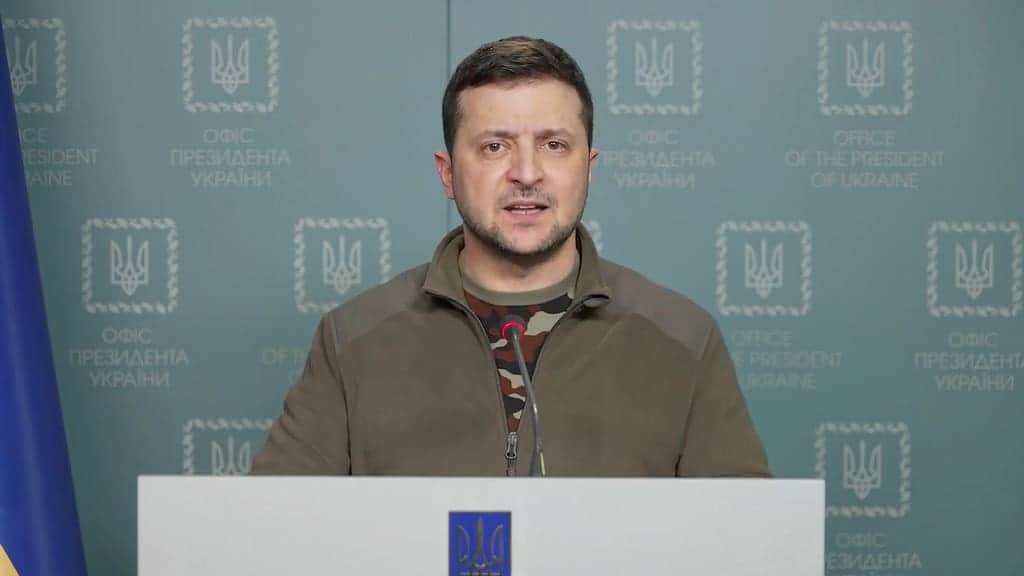
Zelensky rules out peace talks as long as Putin is president.
White House Says Only Zelensky
Gets to Say When Negotiations Will Happen
Dave DeCamp / AntiWar.com & Kyle Anzalone / AntiWar.com
(October 27, 2022) — The White House said Wednesday that it sees no prospects for negotiations between Russia and Ukraine and that it’s up to Ukrainian President Volodymyr Zelensky to decide when talks will happen.
“Neither side is in a position to sit down and negotiate,” National Security Council spokesman John Kirby said, according to The New York Times. He said that “if and when it comes to the table,” Zelensky “gets to determine when that is; he gets to determine what success looks like, and he gets to determine what or what he is not willing to negotiate with the Russians.”
Kirby’s comments are the latest confirmation that the US has no interest in pursuing diplomacy with Russia despite President Biden’s recent warning that there is a greater risk of nuclear “armageddon” today than at any time since the 1962 Cuban Missile Crisis.
Russia has recently signaled that it is willing to hold talks, with the Kremlin saying its goals in Ukraine can be achieved through negotiations, but Zelensky has shown no interest. In response to Russia’s annexation of the Ukrainian territories it controls, Zelensky signed a decree ruling out talks with Russia while Vladimir Putin is president, essentially calling for regime change in Moscow before negotiations can happen.
Ukraine’s war goals are to drive Russia out of all the territory it has captured since February 24 and Crimea, which has been under Russian control since 2014. The prospect of losing Crimea would be viewed as an existential threat to Russia, which could be enough justification to use nuclear weapons under its military doctrine, although Putin said Thursday that he wouldn’t use nukes in Ukraine.
There are virtually no calls in Washington for diplomacy with Russia, even as the war in Ukraine looks like it will drag on for years and years. A group of 30 House Democrats sent a letter to President Biden on Monday calling for talks with Russia, but it was quickly retracted after the lawmakers received backlash.
Putin Blames West for
Killing Ukraine Peace Deal in March

Washington and London kept Zelensky
from signing an agreement with Putin
in the early days of the war
(October 28, 2022) — Russian President Vladimir Putin believes Kiev was unwilling to accept a peace deal in March because of pressure from Washington. Putin joins a growing list of sources who say the war nearly ended after a month, but Western influence prodded Ukrainian President Volodmyr Zelensky to keep fighting.
Kremlin Spokesperson Dimitry Peskov said, “[a]t the same time, [Putin] emphasized that, well, it is obvious that such a reluctance to negotiate and a rejection of already agreed understandings occurred clearly by decree. By decree of Washington, this is quite obvious.”
In March, Turkey hosted diplomats from Ukraine and Russia for talks. Turkish Foreign Minister Mevlut Cavusoglu said the two sides almost reached an agreement that would lead to a ceasefire and a withdrawal of Russian troops from Ukraine. However, talks fell apart shortly after.
On April 5th, the Washington Post reported that some NATO members preferred a protracted war to weaken Russia. “That leads to an awkward reality: For some in NATO, it’s better for the Ukrainians to keep fighting, and dying, than to achieve a peace that comes too early or at too high a cost to Kyiv and the rest of Europe,” the outlet reported. Later that month, while meeting with Zelensky in Kiev, Secretary of Defense Lloyd Austin said one of Washington’s goals was “to see Russia weakened.”
Commenting on the breakdown of talks, Cavusoglu blamed NATO members “who want this war to continue.” “But, following the NATO foreign ministers’ meeting, it was the impression that… there are those within the NATO member states that want the war to continue, let the war continue and Russia gets weaker. They don’t care much about the situation in Ukraine,” Turkey’s top diplomat added.

In May, Ukrayinska Pravda reported that then-UK Prime Minister Boris Johnson traveled to Kiev and pressured Zelensky not to accept the proposal that had been brokered by Turkey. “Johnson brought two simple messages to Kyiv. The first is that Putin is a war criminal; he should be pressured, not negotiated with. And the second is that even if Ukraine is ready to sign some agreements on guarantees with Putin, they are not,” the outlet reported.
Russian Foreign Minister Sergei Lavrov said Kiev had made a proposal at the Istanbul talks that was acceptable to Moscow. “These negotiations at some point at the end of March … led to a result that gave hope to all of us, thanks to the fact that the Ukrainian side for the first time put on paper a position that suited us as a basis for work,” Lavrov said.
Further confirmation that the March agreement negotiated in Istanbul nearly resulted in a Russian withdrawal comes courtesy of Washington. In Foreign Affairs, Fiona Hill wrote:
“Russian and Ukrainian negotiators appeared to have tentatively agreed on the outlines of a negotiated interim settlement. Russia would withdraw to its position on February 23, when it controlled part of the Donbas region and all of Crimea, and in exchange, Ukraine would promise not to seek NATO membership and instead receive security guarantees from a number of countries.”
Hill, the former Senior Director for Europe and Russia on the U.S. National Security Council, accused Russia of systematically attacking America’s democratic institutions in 2016. At Donald Trump’s first impeachment, she testified that it was Russia’s goal to weaken the US.
Kyle Anzalone is the opinion editor of Antiwar.com, news editor of the Libertarian Institute, and co-host of Conflicts of Interest.
Posted in accordance with Title 17, Section 107, US Code, for noncommercial, educational purposes.